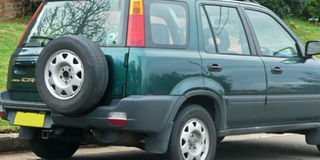Why does my CRV make noise?

Dear Paul
I am an ardent reader of your column. I own a 1999 Honda CRV with five speed Manual transmission. I just imported this car with 120,000KMs on the clock. However, the car makes a lot of noise . I changed the tyres to Linglong brand new radial tyres with same manufacturer specifications of 205/70 R15 so I cannot tell how different it was with the old tyres. I have read online on owner’s forums and some people claim the noise could be because of the type of tyres.
One of my mechanics says the Differential is faulty and needs replacement while another says it’s the tyres. I don’t want to replace a costly item that may not even be faulty.
I love my CRV because of its reliability and rare manual transmission but I hate the noise. What should I do?
Peter
Hello Peter,
Some tyre treads make an irritating noise when driven fast on tarmac, especially when they are still new, in the case of your CRV the same road noise has persisted after you replaced the tyres. The road noise from a wheel is more of a loud rustling sound while that of a damaged differential unit is more like a loud whining or humming sound. You need to try and listen carefully. Let the mechanics drain the differential unit and examine the quantity and condition of differential gear oil. If the oil is very dark or smells burnt and contains pieces of metal debris, it will warrant dismantling to asses the extent of damage and decide repair or replacement plan.
Hi Paul,
I own a 1994 Toyota Corona ‘Kibina’, it has been a reliable car but it developed a fault. When I start the engine, it cranks but does not fire up. My mechanic cannot find a definite cause of the cranking. What could be the problem? Kayanja.
Hello Mr. Kayanja,
Your car has a ‘crank and no start’ condition. Despite being an early generation electronic fuel injection engine, the approach of diagnosing this kind of problem should take into consideration that every engine requires: fuel, spark and compression to start. Ask your mechanic to test for spark at the plug end of the high tension lead using a spark tester. If there is no spark, test for power supply on the positive terminal of the coil. If there is power supply and no spark, the mechanic will need to confirm that the timing belt is not broken or the timing is retarded / advanced. If all these checks find no fault then it’s time to check fuel supply and pressure. Your mechanic should check that the electric fuel pump runs and test the fuel injector pulse with a suitable tool such as a noid light. A fuel pressure gauge if available can also help to confirm fuel supply pressure. If all these tests draw a blank then it will be time to carry out a compression test to confirm the condition of the engine valves and pistons. You will need a skilled mechanic equipped with a compression gauge to carry out this test. One of these tests will find the cause of your car ‘crank no start’ condition. Good luck.
Hello Paul, I have just bought a used Toyota Raum 2003 at 130,000 kilometres. What are the service issues I should attend to before settling down to enjoy this car? Kaweesa John.
Hello John, Toyota would recommend that you undergo the 100,000 kilometre service B inspection. At this mileage, you should consider replacing the long life fuel filter located in the fuel tank to avoid damaging the fuel pump and injectors. Your engine has a timing chain system, which does not require replacement unless its damaged by use of the wrong engine oil grade. Choose a suitable multigrade engine oil with SAE 15W40. Check colour or condition of all fluids and replace where they have changed colour. Pay particular attention to the colour of gearbox oil and brake fluid. These fluids should not be dark with a strong smell. Drain and renew the engine coolant, every two years. There are two types of coolant, the ready to fill pre mixed coolant or the concentrate, which you mix with water on a 50:50 ratio. Good is a heat transfer medium, corrosion inhibitor and a lubricant to protect the water pump. Check or replace spark plugs, air and AC cabin filters, wiper blades, brake pads. At 100,000 kms, you should check or replace all fluids and filters. Endeavour to use genuine service parts as they will protect your car better. Check the condition of tyres and confirm that the tread depth is not below the safe limit or suitable for winter only road conditions. Winter type tyres will fail when driven on our summer type weather.
Ask the mechanic
By Paul Kaganzi
0772316145
send sms: mycar (space) your comments and questions to 6933, or email them to [email protected]




